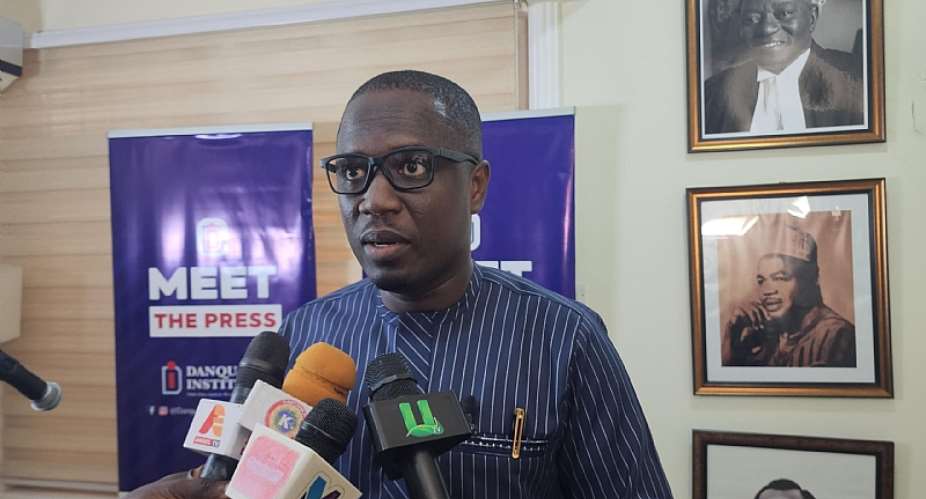The Danquah Institute, a policy think tank, took center stage at a press briefing, defending the government's spending amidst a swirling debate on Ghana's debt trajectory.
Economist and Head of Research at the institute, Dr. Frank Banor, stood firm, urging Ghanaians not to succumb to the opposition NDC's attempts to paint a gloomy picture for political gain.
Delving deeper into the figures, Dr. Banor provided a comprehensive overview of how the $21.1 billion addition to the public debt stock had been meticulously allocated across various sectors. The investments, he emphasized, were not frivolous expenses but strategic decisions aimed at propelling Ghana's development forward.
Infrastructure projects emerged as shining examples of progress: from the completion of multipurpose sports stadiums in all ten regions to the procurement of essential equipment for the Ghana Police Service, the government's commitment to improving the lives of its citizens was palpable. Moreover, the establishment of state-of-the-art technical and vocational training centers across Ghana underscored a dedication to equipping the workforce with the skills needed for a thriving economy.
But it wasn't just about physical infrastructure. The financial sector clean-up, a hefty investment totaling GH¢21 billion, was necessary to restore confidence and stability in the banking sector. The establishment of the Consolidated Bank Ghana Limited, as a bridge bank, ensured that depositors affected by the crisis were protected, laying a solid foundation for the sector's future growth.
In the energy sector, significant investments totaling $937.5 million were made to enhance production and meet the nation's growing energy needs. Payments to independent power producers like AKSA, Karpower, and Cenpower underscored the government's commitment to ensuring a reliable and sustainable energy supply for all Ghanaians.
Again, the 4.5km reconstruction of Otanor-School Junction, the 6.90km rehabilitation of Kwabenya-Taifa road, the 14km Obuasi Junction-Dunkwa road, the 13km rehabilitation of Gambaga/Nalerigu town road phase 1, 10.7km Asutiano-Dormaa Akotanim road, 35km Borae Junction-Kpandai-lot 2 and many other more has been completed.
Amidst the discourse, a stark contrast emerged between the debt trajectories under different administrations. While the NDC government from 2009 to 2016 saw an average annual addition of 32.75% to Ghana's debt stock, the NPP government from 2017 onwards managed a more modest increase averaging 10.68% annually.
In conclusion, Dr. Banor emphasized the multifaceted nature of Ghana's debt profile and its pivotal role in shaping the nation's future. Through prudent spending and strategic investments, the government aimed not only to address immediate needs but also to lay the groundwork for sustainable growth and prosperity for generations to come.





 France kicks off May Day rallies a year after pensions backlash
France kicks off May Day rallies a year after pensions backlash
 EU probes Facebook, Instagram over election disinformation concerns
EU probes Facebook, Instagram over election disinformation concerns
 Kenya’s devastating floods expose decades of poor urban planning and bad land ma...
Kenya’s devastating floods expose decades of poor urban planning and bad land ma...
 May Day: We’re committed to giving you brighter future – NDC assure workers
May Day: We’re committed to giving you brighter future – NDC assure workers
 Kasoa: Military officer shot dead over land dispute at Millennium City
Kasoa: Military officer shot dead over land dispute at Millennium City
 'It's a digrace for Akufo-Addo gov't' – Aduomi on vote-buying allegations at Eji...
'It's a digrace for Akufo-Addo gov't' – Aduomi on vote-buying allegations at Eji...
 Yagbonwura was never asked to stand and greet President Akufo-Addo – Chieftaincy...
Yagbonwura was never asked to stand and greet President Akufo-Addo – Chieftaincy...
 Ejisu by-election: We must ‘aggressively’ reach out to disgruntled NPP members –...
Ejisu by-election: We must ‘aggressively’ reach out to disgruntled NPP members –...
 We’ll bring back Aduomi to NPP – Stephen Ntim
We’ll bring back Aduomi to NPP – Stephen Ntim
 Ejisu by-election: Provisional results so far
Ejisu by-election: Provisional results so far
